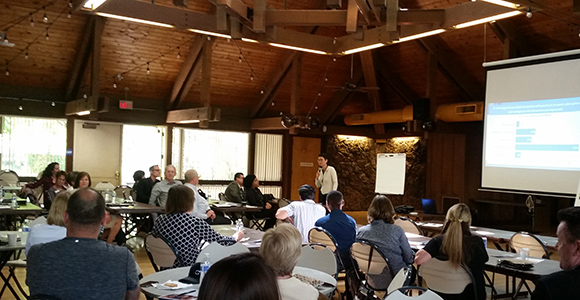
California Community Colleges Executive Vice Chancellor Van Ton-Quinlivan speaking at Chico Future of Work MeetUp (Photo Credit: Leah Grassini Moehle/CA Fwd)
For most Californians, Butte County is north of Northern California — and they may not realize how much geography lies between Chico and the Oregon border.
The economy in this region is different than — yet in other ways, the same as — more urban regions in California that look and feel like the Pacific Rim or the center of their universe.
One big difference here is that highly trained young adults are counseled they will likely have to head to a bigger city to pursue well-paying jobs on a career ladder. California State University Chico produces a lot of professionals who migrate south and west each spring.
The similarities are interesting and important, as well — how can they create a pathway that works for young people who are not on track to a four-year degree.
One emerging strategy is to link efforts to support entrepreneurs and small business lead by recent graduates with workforce development efforts that could lead to employment by middle-skilled workers.
The Chico Stewardship Network, Advance North State and Chicostart are civic entrepreneurship organizations working with K-12 school districts, the Butte County Office of Education, city government and the Butte-Glenn Community College District to put the pieces together. Their version closely links efforts to incubate new companies with work-based learning to simultaneously nurture jobs and workers. Their successes include specialty software companies and advanced manufacturing.
About 50 leaders from business, education, community-based organizations, and economic and workforce development agencies met in early April to share what they with doing and to discuss the future of work with the California Community Colleges Chancellor’s Office.
Some of their recent initiatives – including the expansion of health care and advanced manufacturing pathways – have been funded by the Strong Workforce Program, which the CA Economic Summit helped to develop, enact and now implement.
Van Ton-Quinlivan, the state’s executive vice chancellor of workforce and digital futures, explained the next step is to find new ways to reach 2.5 million under-skilled Californians, and build a restructured online program has the potential to provide that education when, where and how it is needed by would-be students.
Governor Brown has proposed creating a 115th online college as a way to reach Californians who need to develop additional skills to rise above minimum-wage jobs and stay ahead of shifts in the economy.
Participants in this Future of Work MeetUp in Chico were dually concerned about young people who did not seem to have the drive or direction to pursue skill development or a career, as well as workers who hold good jobs now but will need additional training as technology replaces some jobs while creating new ones.
Local officials estimate 15,000 young adults in the region don’t have the necessary skills to thrive now or in the future. Community leaders in the room said some of those residents are single mothers, while others have a criminal record. Many barely navigated high school and have not been able to navigate campus-based community college.
In general, community leaders said an online alternative could help – provided it addressed the need for mentoring and the internet-access gaps for anyone living outside downtown Chico.
“This is not an individual sport. This is a team sport,” Ton-Quinlivan said. “There is a lot of need. We want to serve those workers who need to come back for educational booster shots, time and again.”
Butte leaders suggested partnering with community-based organizations, who would know who could benefit and could guide those individuals into the online programs and other services.
The Strong Workforce Program and the proposed online college also could be complemented with a new Butte College Promise, which is launching in fall 2018 and will provide two free semesters for students, said Les Jauron, Butte College vice president of planning, research, and organizational development.
In addition to the scholarship, Jauron said the new program has been an opportunity for educational partners to get aligned with community leaders to set new expectations for young people, and back those expectations with a promise of support so everyone can envision themselves completing post-secondary education.
The program is adapted from the Long Beach College Promise, and in fact Long Beach Unified School District Superintendent Chris Steinhauser visited Chico to advise Butte on how to adapt the program to their more rural setting – one more example of a regional innovation being replicated in another part of California.
The conversations and innovation sharing continues as the Future of Work MeetUps series keep going across the state through May.

